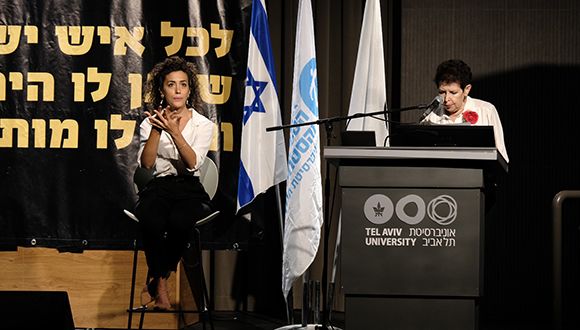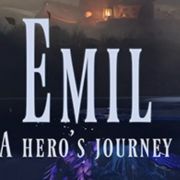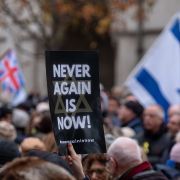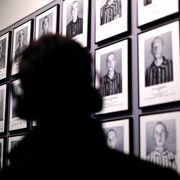"If Then There Was a Rebuilding of Personal and National Lives, So Shall It Happen Again"
Professor Dina Porat's Remarks at the Holocaust Remembrance Day Ceremony at TAU
The Holocaust Remembrance Day ceremony, honoring the survivors of the Holocaust and commemorating its victims, took place on the Tel Aviv University campus, attended by a large audience of students, faculty, administrative staff, and other guests. The sentiment was that this year, more than ever, it is crucial to recount and commemorate what happened to our brothers and sisters. Alongside this, to illustrate the extensive number of those abducted and remaining captive in Gaza, the audience stood up and counted together up to 132. There wasn't a dry eye in the house.
"We have no right to forget, no authority to forgive, and we are committed to testify and document"
Prof. Eyal Zisser, the University's Vice Rector, delivered opening remarks: "Every year at this time, and especially this year, once again we find that the modesty of words fail to convey the magnitude of horror and the extent of loss. There are no words capable of explaining and no language capable of containing. It happened! For millions, millions of real people, Jews like you and me, like us, whose only sin was being Jewish. In our distress, we find solace in the elevation of stories of bravery and humanity who were like scattered beacons in the fields of darkness and death. Even today, we continue to draw strength from these stories and learn about the sanctity of life, determination, and resilience - qualities that human beings are capable of even in the face of the most horrific circumstances".
"This year, an additional dimension of pain is added to this day, under the shadow of the war we have been in since the terror attack on October 7, in which Jews were slaughtered in a manner and scale we had not known since the Holocaust. The call 'Never again' reverberates as a cornerstone of our existence here, on this land, uniting us in a shared destiny that will not be erased. Here we are, hurting, sad, longing, but still standing tall and proud, continuing to say 'Never again.' However, we cannot define ourselves solely as the Jewish phoenix, rising and falling, rising from the ashes. As we face the challenges at the forefront of Israel's development, we must continue to build and establish a democratic society and a rich culture here. Thus, we will ensure that here, in the flourishing enterprise in the land of our forefathers, the Jewish people will merit defense and security, and will continue to grow, develop, and be an example for the nations of the world".
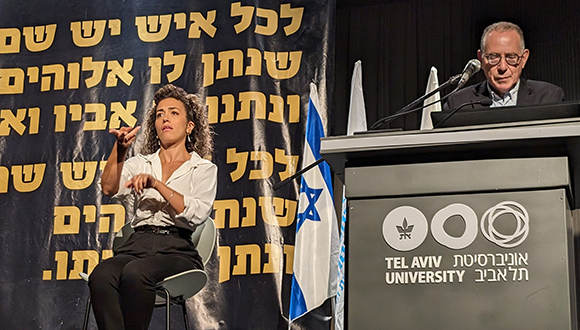
Prof. Eyal Zisser and Iris Ben-Moshe
"In their deaths, they commanded us to have hope"
Danielle Zilber, Chair of the Student Union, urged the student body to remember their role as the future of the State of Israel.
Part of the significance of remembering the fallen is to carry their lost hopes... We must not only remember but remind, remind the world of the horrors that occurred and not let them forget no matter how much time has passed since the Holocaust. In the name of the fallen, we sit here today, with the lost hope of 6 million of our brothers and sisters. In their name we say never again, and in their name, we have to remember.
A Lighthouse in the Darkness of the Holocaust
David Gur, an activist in the underground Zionist movements in Hungary and currently chairman of the Association for the Study of Zionist Youth Movements in Hungary, took the stage with his granddaughter.
.I am 98 years old. During the war, I was 18, younger than all of you. Today, I came to speak about hope and heroism, not about victims, pain, and loss
Thanks to the activity of the underground in which he participated, the lives of thousands of Jews were saved, as they provided documents and ensured food and shelter for many orphaned children. 'I am grateful that I was part of the unique and immense rescue operation of the Zionist Youth Movement underground in Hungary. The existence of the underground, the bravery of young Jews facing terrifying forces, deserves to be heard and remembered as part of the sources of the Jewish people, and to pass on their story as an example of resistance, a struggle to save Jews, and unity in rescue actions and unity of hope, inspiration, and lessons for generations to come'.
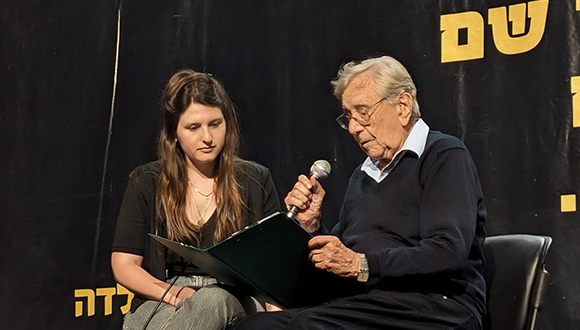
David Gur and granddaughter
The Bigger the Crime, the Deeper the Denial
Professor Dina Porat, the leading historian of 'Yad Vashem' and professor emeritus in the Jewish History Department at Tel Aviv University's Stephen Roth Institute., shared the personal tragedy that happened to her family residing in communities surrounding Israel and asked three questions about which every one of us will need to think about how to answer.
"This Holocaust Remembrance Day, it seems that all of us feel very differently from the previous ones. The events of October 7th immediately raised a series of associations and memories of realities and testimonies that had long become a collective memory. The word 'Holocaust' to describe the murder of Jews by the Nazis and their helpers was not chosen by a committee or an academic institution. Its use arose spontaneously from the public, and not by chance: it is a biblical expression, describing a natural force that suddenly appears, unexpectedly, without prior knowledge, without preparation. Not only did the word 'Holocaust' and not only did the associations arise immediately, but also questions that have accompanied us since the Holocaust, and perhaps we can draw on the experience accumulated since then.
"The first question: How did they approach the work of memory and commemoration? How did they collect tens of thousands of testimonies from dozens of countries in different languages, and consolidate them to one place- at Yad Vashem? Now, the sharp question arises, given the vast proliferation of communication and photography tools, documentation, and broadcasting - if an effort is not made to collect at least copies of all the testimonies that are heard and broadcast in the media in Israel and around the world, why what happened on October 7th, in one place, there will not be a complete picture in the future.
"The second question: Since the Holocaust ended, denial began immediately, and in fact, the Germans began to hide evidence while it was happening. The attempt teaches that the size of the crime is indeed the depth of the denial, and so is the immediacy of the denial. Not only the Holocaust but many other crimes were being denied, because denial aids forgetfulness, both stem from the same root, and it helps escape punishment. The first book to deny the Holocaust was published as early as 1945, and after October 7th, we didn't have time to turn around and already began talking about the fact that there is no evidence and it is not possible.
"The third question: Is it appropriate to celebrate during and after a disaster? In March 1943, 80 years ago, the students at the Hebrew University debated whether to hold the traditional Purim carnival and just a few months after became known that the killing of Jews was systematic. Also, in Dalia Kibbutz, they asked what should happen to the dance festival. Today we also debated what to do on Purim and Passover, and next week on Independence Day. So, both then and today, two parallel paths were created, with anger and sorrow on the side, the ongoing life, and the marking of holidays and festivals, maybe as a matter of fact, especially life.
"Since that terrible day, so many young flowers have been buried, too many young ones, and therefore, with all the sorrow, it was decided to continue forward, to look ahead, to volunteer. Close to two thousand survivors left their homes on October 7th, over five hundred of them from the surrounding area. There is no uniform response among the survivors to the events, each one responds to you in their own way, but some of them say: there is no doubt that it was a terrible day, with severe consequences in every aspect of our lives, but the comparison to the Holocaust is not one to one, and the comparers know this, because with all the pain and the associations, it is clear even to those who use the word Holocaust that this is a completely different event in its scope. And if then there was a renewal of life and a rebuilding of personal and national lives after the Holocaust, there will also be this time. Not tomorrow and not even the day after tomorrow, but there will be."


